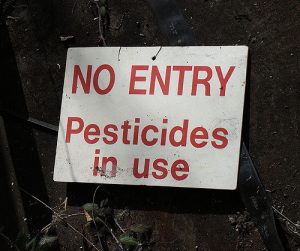Farmworkers’ exposure to certain pesticides may lead to thyroid problems
 Photo credit: Andy Powell
Photo credit: Andy Powell
A new study using data from the Agricultural Health Study and published in the journal Occupational and Environmental Medicine examined the association between pesticide exposure and thyroid function in agricultural pesticide applicators. The study utilized pesticide use data from 679 men enrolled in the study between 1993 and 1997. Between 2010 and 2013, researchers collected blood serum from each participant and tested for levels of thyroid-stimulating hormone, thyroxine, triiodothyronine and antithyroid peroxidase autoantibodies. They found that exposure to the insecticide aldrin and the herbicide pendimethalin were significantly associated with subclinical hypothyroidism, and that exposure to the fumigant methyl bromide was associated with decreases of thyroid-stimulating hormone and associated with increases in thyroxine. “Our results suggest that long-term exposure to aldrin, pendimethalin and methyl bromide may alter thyroid function among male pesticide applicators,” researchers concluded.


